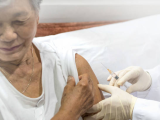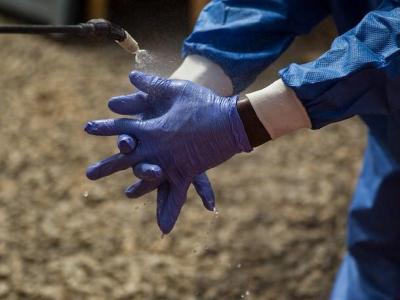Sep 30. 2009 (CIDRAP News) – As pandemic flu activity picks up speed across the nation, groups that serve older adults are shoring up plans for both seasonal and pandemic flu vaccination and are preparing backup plans in case absences hit key services such as Meals on Wheels, government officials and senior groups said today.
Anthony Fiore, MD, a medical epidemiologist at the US Centers for Disease Control and Prevention (CDC), said today during a Health and Human Services Web telecast that seniors and organizations assisting them shouldn't let their guard down, even though the biggest infection burden is falling on younger people. He said pandemic flu can still strike older people this season, as can seasonal flu, which typically leads to 36,000 deaths each year, 90% of them in seniors.
Older people should get their seasonal flu shots now, as well as a pneumococcal shot if they are due for one, Fiore said. Though the first doses of the pandemic H1N1 vaccine are earmarked for high-risk groups, when the vaccine becomes available in larger quantities, seniors can and should receive the shot, he added. "But don't wait for the pandemic vaccine—the others are important to get right now," he said.
Kathy Greenlee, assistant secretary for the HHS Administration on Aging, said advocacy groups that are working to reverse health disparities have flu vaccines in their sights. People of color are less likely to get seasonal flu vaccines, but the pandemic vaccine campaigns offer another chance to improve uptake in these groups.
James P. Firman, EdD, president and chief executive officer of the National Council on Aging (NCA), said senior centers are on the frontlines of getting the vaccine message out and are often the site of vaccine clinics. Senior centers can also help protect older adults by following good hygiene steps and making sure staff, especially those who transport people and work in kitchens, stay home when they're sick.
Organizations that provide Meals on Wheels services should have backup drivers and plans in place if absences due to the flu threaten food delivery schedules. For example, some groups plan on delivering frozen meals to seniors if driver shortages occur.
A key goal for the NCA and other organizations is to provide flu and vaccine information to seniors who don't normally come to senior centers and activity sites. "That's our collective challenge: Don't be satisfied by reaching just those who come to us," he said.
Sandra Markwood, chief executive officer of the National Association of Area Agencies on Aging, said fall health fairs can offer a timely springboard for getting pandemic flu and vaccine messages to seniors.
Firman said one way to promote seasonal and pandemic flu shots to older people is to appeal to their frugality. "You can help people get over the hump if you tell them 'It's free,'" he said. Flu vaccines are free for those in Medicare, though others may need to pay for a doctor's visit. He said seniors can minimize the cost by requesting the shot during other medical appointments or by getting vaccinated at a flu shot clinic, where there is typically no charge for immunization.
Local organizations are looking for more guidance about pandemic flu in relation to older people, particularly regarding the vaccine, Firman reported. For example, he said more than 3 million seniors in the United States are raising their grandchildren, and it's not clear if they should be getting the vaccine to help protect younger people.
Fiore said people who care for babies 6 months or younger and those who take care of frail elderly people are among the priority groups to get flu vaccines.
Informal senior networks, such as bridge and garden clubs, can even help look out for seniors during flu season, Firman said. Members can be encouraged to check up on each other, especially when members who live alone don't show up for meetings. "Be good neighbors, be good friends, and support each other," he said.
















